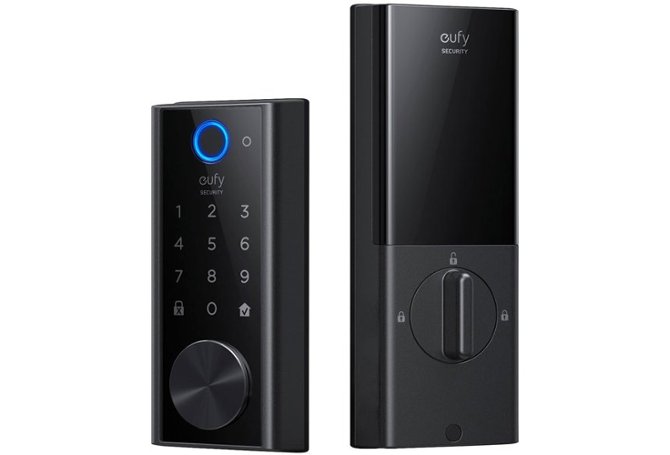How Do Smart Locks Work and Are They Safe?

Best Selling Products carousel(6 Items)
Smart locks are becoming increasingly popular as people look for ways to secure their homes without the hassle of keys. Keyless entry locks can also offer customizable access to visitors, like guests or neighbors.
But how do smart locks work and are they safe? This article will consider those questions and more so that you can decide if a smart lock is right for your home or business.
What are the advantages of smart locks?
One main advantage of a smart lock is the elimination of the need to carry keys. No longer do you need to fish around in your pocket while standing on the welcome mat with an armful of groceries. Nor do you need to worry about accidentally locking yourself out of the house. Also, there’s no reason to hide an emergency key under the flowerpot that someone could find. Plus, you can unlock your door using an app on your smartphone.
Smart locks offer customization so that you don’t need to have an extra set of keys made for dog walkers or cleaning crews. You can create custom codes for those individuals and change the codes on a regular basis or when you hire someone new.
Wireless smart locks enable you to lock and unlock the door remotely with an accompanying smartphone app, as well as monitor who’s coming and going. Therefore, you can feel more secure when you’re gone for extended periods. You can even let in a friend to water the plants while you’re on the other side of the world. By setting up alerts on your smartphone, you can receive notifications when someone leaves or when the kids get home after school, much like a door alarm.
Because smart locks function differently from traditional locks, it is extremely hard to compromise them. And some smart locks offer features like auto-locking that allows you to set a time at which your door will lock automatically at night.
Are there disadvantages to keyless locks?
The most obvious disadvantage of smart locks is that they are more expensive than traditional locks. Because the upfront cost is higher, installing them can be an investment. If you rent, you will need to talk to your property owner about whether they allow smart locks on the property or not, or if you will be able to take them with you when you move.
Another aspect to consider when calculating costs is the price of connecting to Wi-Fi if you want to use features like remote locking and unlocking. To use features like voice activation, you’ll need to connect it to a smart home speaker or display.
Other disadvantages include the kinds of issues you might run into with electronic devices in general. Wi-Fi connections can be affected by power outages or router malfunctions. Losing your phone (or having it stolen) includes added risk when it includes a lock app. And smart locks use batteries, which need to be replaced regularly.
As a result, it’s wise to make contingency plans for these possible scenarios where smart locks become disconnected from Wi-Fi. For example, choose a model that has a backup battery as opposed to only being hardwired in.
Can smart locks be hacked?
You might be wondering whether smart locks that connect to the internet are susceptible to hacking. The answer is yes. Anything that connects to the internet can be hacked. But before you panic, rest assured that it will take concerted effort for someone to gain entry without having the code. There are three main ways a Wi-Fi keyless door lock could be compromised.
The first is a breach of your household Wi-Fi. To access the smart lock this way, the hacker will have to be in proximity to the lock itself. Alternatively, also from close range, they can try listening in to the Bluetooth communication with the lock (if your lock uses Bluetooth). From a greater distance, a hacker will have to break into your phone’s lock app. You make yourself vulnerable to this if you do not keep the app and the phone’s operating and security software updated.
Can you defend your locks against hacking?
To safeguard against hacking, you should always update your lock and any corresponding security apps with the latest firmware. You should also look for a trusted lock brand and consider the lock’s ANSI (American National Standards Institute) grade rating, which measures the strength of its security. You can also choose an AES (Advanced Encryption Standard) lock and set up a two-factor authentication process, which is a great for peace of mind when you’re away from home on vacation.
On that note, you can integrate your smart home devices with each other for comprehensive monitoring. Another way to ensure that your smart door locks are protected from hackers is to rely on a professional who is certified in smart home setup and installation. Then you can be confident that everything is secure and running efficiently.
Choosing the best smart lock for your home
When it comes to choosing the best smart lock for your home, consider whether you want it to coincide with other door and window security devices that you already own or are thinking about installing. Smart door locks used together with outdoor security lighting and smart plugs and outlets can help make you more at ease when you’re arriving home or when you’re headed out for the night.
In general, smart locks offer a lot of options to increase convenience and your home security, but, like regular locks, they are not perfect. Ultimately, deciding whether the investment is right for you depends on the way you want to regulate entry and exit to your home. Once you have this decided, you’ll be better prepared to choose the best smart door lock for your front door, back door or side door.